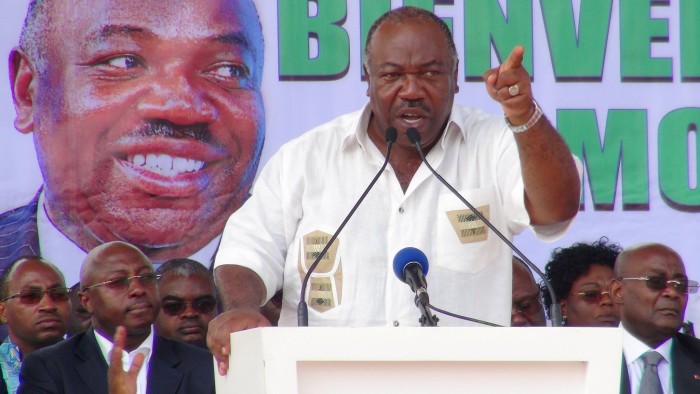Bongo win in Gabon election extends his family’s 50-year rule

Roula Khalaf, Editor of the FT, selects her favourite stories in this weekly newsletter.
Protesters took to the streets in the central African nation of Gabon late on Wednesday after Ali Bongo, the incumbent, was declared the winner in a fiercely contested presidential election.
Mr Bongo’s narrow victory secured the extension of his family’s near 50-year rule of the oil-rich nation.
There were some reports that protesters had set fire to the parliament building. Photos showed a huge, billowing cloud of smoke filling the night sky in Libreville, the capital, and there were reports that security forces had fired tear gas to push back several hundred protesters.
The EU, France, and the US urged calm as the results were announced almost a day later than the government had promised.
The opposition immediately denounced the vote as “stolen”, while EU observers have said the electoral process lacked transparency. The announcement was delayed by nearly 24 hours, reportedly due to a dispute over the tally of ballots in Mr Bongo’s home province, which added to tensions in Libreville.
Pacome Moubelet Boubeya, the interior minister, said Mr Bongo secured 49.8 per cent of the vote, while Jean Ping, his challenger, garnered 48.23 per cent.
The EU urged the results for each polling station to be published.
It was the country’s most tightly contested presidential election since it adopted multi-party rule in 1990 — a period when many African states began to mover from years of one-party rule.
It was also the first time the Bongo family’s grip on power had been seriously challenged at the ballot box.
Both candidates had predicted that they had won before the results were announced. As tensions rose, police and soldiers were deployed in the capital and residents stockpiled food.
“We don’t have confidence in the process. We have never had confidence in the process,” Jean Gaspard Ntoutoume Ayi, Mr Ping’s spokesman, told Reuters. “The Gabonese people will not accept these figures.”
Mr Bongo has been in power since he won 2009 elections that followed the death of his father, Omar Bongo, who had ruled the country with a tight grip for 42 years. His presidency was tainted by corruption allegations and accusations by the opposition — which was virtually powerless — that he looked after his own business interests and those of former colonial ruler France at the expense of his people.
After succeeding his father, Mr Bongo positioned himself as being committed to diversifying the economy away from oil, preserving the country’s vast rainforests and wildlife and helping neighbouring west African states, such as Nigeria, fight Islamist extremism.
During the election campaign, Mr Bongo pledged to do more in his second term to tackle poverty and dilute the economy’s dependence on oil. Gabon’s petrodollar wealth has made it one of Africa’s richest nations but the opposition says it has not trickled down to improve the lives of the majority.
Mr Ping’s unexpectedly strong showing at the ballot box came after he managed to harness the support of a previously divided opposition, observers say. Two other candidates withdrew from the race and urged their supporters to vote for Mr Ping, a veteran diplomat and former chairman of the African Union commission.
Mr Ping was a long-time ally of Mr Bongo but fell out with the president and left the ruling party in 2014. His whereabouts on Wednesday evening were unknown.
Comments